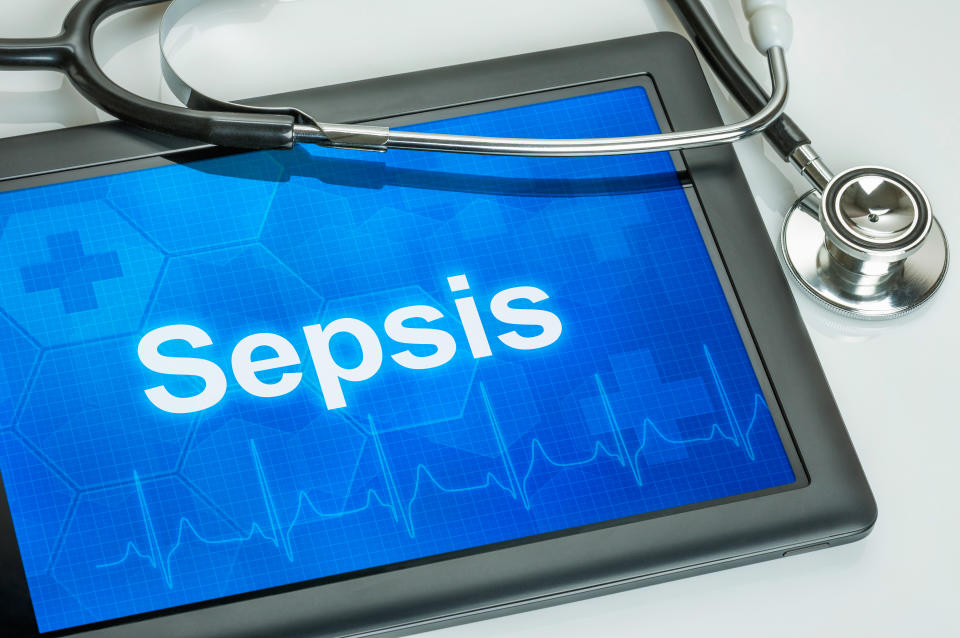What The Health?! Whoopi Goldberg says she came 'very close' to death after developing sepsis - but what is it?
Can leftover spaghetti really kill you? Can you actually cough up a blood clot in the shape of your lung? In Yahoo Lifestyle Canada‘s newest series, What The Health?!, we ask doctors to weigh in on odd health news stories and set the record straight. Be sure to check back every Friday for the latest.

Whoopi Goldberg recently developed pneumonia in both lungs, and she says she “came very, very close to leaving the earth”.
As if the chest infection itself wasn’t nasty enough, the 63-year-old cohost of “The View” also became septic. Caused by the body’s response to an infection, sepsis can be deadly.
Goldberg described her experience in a pre-recorded video that aired on the show earlier this month.
“Hey, yes, it’s me,” she said. “I am here. I am up and moving around. Not as fast as I’d like to be, but I am okay. I’m not dead,” she said.
ALSO SEE: What The Health?! Did this 25-year-old contract a rare autoimmune disorder from a cat?
“So here’s what happened: I had pneumonia and I was septic,” she revealed. “Pneumonia in both lungs, which meant there was fluid. There was all kinds of stuff going on. And yes, I came very, very close to leaving the Earth. Good news, I didn’t.”

More recently, Goldberg surprised her co-hosts with an on-air appearance, describing her situation as a “cautionary tale”.
What is sepsis?
Here’s how sepsis works: normally, when you have an infection, the body releases chemicals to fight it. But sometimes the body’s response to those chemicals is overwhelming, leading to widespread inflammation, impaired blood flow, and, potentially, organ damage or organ failure, according to the National Institute of General Medical Sciences.
ALSO SEE: What The Health?! Ontario man’s heart excavated from calcium shell
Even more dangerous, sepsis can progress to septic shock, and blood pressure can fall dramatically. If it’s not treated urgently, multiple organs, such as the lungs, kidneys, and liver, may rapidly begin to fail, resulting in death.

“Sepsis is a life-threatening condition that arises when a body’s response to an infection injures its own tissues and organs,” David D. Sweet, doctor of critical care medicine at Vancouver General Hospital and chair of the B.C. Sepsis Network said in an interview with Yahoo Canada Style. “Any infection, if severe enough, can result in sepsis.
“‘Being septic’ is a term often used by health-care professionals to encompass both sepsis and septic shock,” he explains. “Sepsis is when a deregulated immune system due to an infection is causing organ damage or organ failure. Septic shock is the most severe form of sepsis where the blood pressure drops, the organs are no longer being adequately perfused, and death can quickly result if it is not treated.”
Pneumonia is the most common cause of sepsis, Sweet revealed. Other causes include severe kidney or skin infections, bloodstream infections, meningitis, or infections in the abdomen, such as those that occur with appendicitis or bowel rupture.
Sepsis can also be caused by infections associated with seasonal flu viruses, dengue viruses, and avian or swine influenza viruses. It can be caused by bacteria, fungi, and parasites.

Sepsis is one of the leading causes of death worldwide. According to Statistics Canada, it was the 12th leading cause of death in Canada in 2011, responsible for one in 18 deaths.
What makes sepsis so threatening is the fact that it can be difficult to diagnose. Considered a “syndrome”, sepsis is a constellation of many different symptoms.
“It can be hard to determine when a simple infection is transitioning to sepsis,” Sweet says.
To prevent infections from going from bad to worse, it’s crucial to know the signs of sepsis, symptoms that call for immediate medical attention.
ALSO SEE: Doctors blamed this woman’s back pain on ‘depression’ — but it was actually stage 4 cancer
Sepsis warning signs
The Global Sepsis Alliance recommends learning the SEPSIS acronym, which stands for:
– Slurred speech or confusion
– Extreme shivering or muscle pain/fever
– Passing no urine all day
– Severe breathlessness
– It feels like you’re going to die
– Skin mottled or discoloured
Sweet notes that early identification and diagnosis are vital, with treatment including early antibiotics and/or intravenous fluids to maintain organ perfusion. Sometimes, removal of infected tissue or pus is required; in certain cases, organ and life support, such as renal dialysis and mechanical ventilation or breathing machines are necessary.

According to the GSA, many sepsis survivors experience life-long effects, including sadness or anxiety; trouble swallowing, sleeping, or concentrating; and poor memory or clouded thinking.
Anyone can get sepsis, however toddlers under a year-old, adults over 60, and people with compromised immune systems or chronic disease are at greater risk.
Sepsis can be avoided by preventing infections in general by taking preventative measures such as vaccines, good hand hygiene and maintaining good health overall.
Let us know what you think by commenting below and tweeting @YahooStyleCA!
Follow us on Twitter and Instagram.
Check out Yahoo Canada’s podcast, Make It Reign — our hot takes on all things royals in a non-stuffy way — on Apple Podcasts and Google Podcasts.



